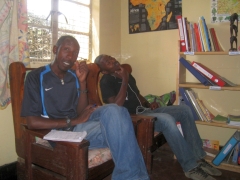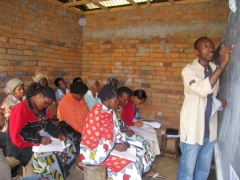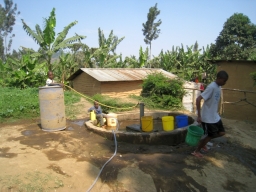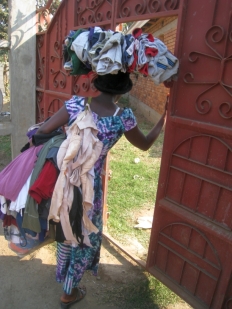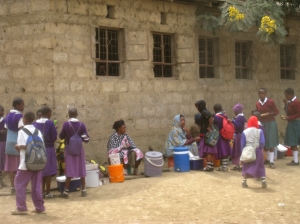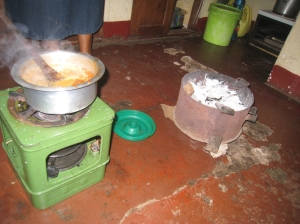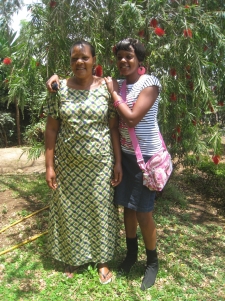For Ilboru’s grant round many mamas came along fishing, looking for easy money from the “mzungu” and it proved harder than expected to identify genuine candidates. My initial aim was to elect 10 mamas but I had to settle in helping 7 women… and 1 man!

The Draw
Each grant recipient has a donor associated with her/him. What do I mean? Well, as a special thank-you to all my friends & family who donated to make this project a reality, Naomi, my younger Tanzanian sister, drew each candidate’s names and assigned it a donors. These are the first 8 grants, more to come later. Please note, the amount granted to each candidate has absolutely no connection with your donation amount, as all were put in a pool and I just drew from it as appropriate.
Below is a resume of each grant recipient. A couple of notes:
- Tanzanian people are often called by their eldest child’s name, regardless if it’s a boy or a girl. For instance, Agnes eldest child is Maggie, thus she’s called Mama Maggie.
- I you catch my drift… I removed the HIV status of each Mama.
Quick jump to each candidate:
Agnes Faustini – Mama Maggie
Thank you Mark, Catherine and Julia

Agnes
Agnes is a very quiet and shy, divorced mother of 3 living in the Ilboru region. Her living situation is quite poor, sharing a 1 room house of mud and stick construction with her children: Marguerite (F, 16, mentally challenged and was taken out of school), Antonia (F, 14, Form 1) and Evodia (F, Std 4). As a business Agnes rents a small and basic “4 poles and a roof” stall on the side of the main Ilboru Juu road where she sells vegetables and fruits. She’s been running this business for 5 years and makes around 15,000Tsh/week, barely enough to suffice her family. Agnes doesn’t seem to be able to exit her low earning biz cycle. Recently, she took Marguerite out of school (it seems Magi couldn’t cope with her class education level) and Angelina, a seamstress and one of our success story from the 2010 grant round, took Magi under her wing and is teaching her how to seam.

Agnes's home
Agnes wants around 60,000Tsh from FutureSense to expand her vegetable offering by providing products her customers are currently requesting: cooking bananas, sweet bananas, coconut… and other seasonally available produce. Although many other vegetable vendors are present nearby, Agnes have a faithful customer base including Sam and Sister Lucy (and temporary me ;)). She mentioned she wants to concentrate on selling products which Ilboru residents do not grow. Personally, I have some concerns on her business expansion plans, most importantly the fact she will have difficulties increasing her customer number in this small neighborhood and with many competitor nearby. She could expand into other markets and diversify her offering (more than fruits and veggies) yet a seemingly lack of enthusiasm weight her case down. On the bright side, people familiar with Mama Magi mention she works very hard on her business and is dedicated to raising her family: within her limited means, Agnes always makes sure her living situation remain stable.

Veggie stall
After discussing all the pros and cons with the team, we recommend issuing a loan to Mama Maggie based on her living situation and the fact that although the potential of biz growth is small, her ability to run a stable business will assure a small and steady income increase for her much in need family. At the same time, Sam and I have been pushing Agnes to provide us with more ideas to expand her business: can she grow her stand size? Can she offer more products to sell? Or maybe diversify into new product lines on top of her veggies?… unfortunately it is hard to get Agnes engaged, with one of her biggest concerns being the owner of the shack; he will substantially increase her stall the rent (currently a mere 2,000Tsh/mth) if he noticed she’s making a higher income. I will even go as far as describing this fear as being a “blinding handicap”, overpowering any thoughts Agnes have in term of expending her business, leaving her frozen in her current living condition.
As it stands now, the grant amount requested is still unchanged although it might be reviewed as we help her develop her business plan.
Anna George – Mama Grace
Thanks Albin

Anna
Anna is a previous grant recipient back in 2010. Anna has a “mboga-mboga wa matunda” (vegetable & fruits) stall and she used the initial grant round to expand her business offerings. Based on her and Sam’s feedback, her business was doing pretty good… until a piki-piki hit her while she was crossing the street. The accident left her severely injured and Anna required 6 months of hospital, rehabilitation and rest which took its toll on her business. Not only she could not attend her business, she had to downsize and borrow money to pay her hospital bills. On a bright note, she got financial support from both DINKWA and the other grant recipients! Unfortunately the accident also had indirect victims: Anna’s children! Grace (F, 15, was in Form 2) had to abandon school because Anna couldn’t afford the tuition fees. As for her son Moses (M, 22) he left technical school and now is an apprentice motorcycle/moped mechanic and. All 3 live in a small 1 room mud and stick house which Anna rent for 15,000Tsh. Today, Anna is back selling vegetable but her offering is very limited due to lack of capital. Any money she saves is used to repay her medical bill loan which still stand @ 50,000Tsh, a year after the accident. Discussing with Sarah, we feel Anna would greatly benefit from our help, allowing her to get back on her feet again.
All we want to do is to replenish Anna’s stall with a top up. She asked for 150,000Tsh to buy 50Kg bags of potato and onions (1 bag each). However, I am not sold on that sum not the least it’s supposed to be a further help. Beside, Mama Maggie’s stall is 50m away and we granted her 60,000Tsh to expand her business. We just have to follow the same treatment be fair to both women.
Berth Alex – Mama Alex
Thank you Nada, Eric & Yasmina

Mama Alex
Mama Alex is a happy and popular owner of a fried fish stand not far from DINKWA office. She has also become my favourite lunch spot in Ilboru. Her stand is pretty rundown: 4 poles and a very dirty tarp as a roof (previously white and full of holes). A small bench is all she can offer her customers yet it doesn’t stop them from coming regularly to eat; many repeat customers from the nearby businesses and small workshops flock to her stand at lunch time. It’s not uncommon for Mama Alex to sell most or all her fish by early afternoon.

Space management: behind the curtain is the bed
Berth lives in a rented room just behind her stall and shares it with her daughter Helena (F, 14, Form 2) and her grandson Leonard (M, 7, std 2) who was abandoned by his mom Monaicha (Mama Alex’s daughter) when she ran away. Mama Alex was very emotional and cried when she told us the story of her son Alex: he was a piki-piki driver (small motorcycle used as taxi) until Alex got into an accident a couple of month ago which left him with a multiple fractured left leg. His severe injuries are a disability and Alex is currently unemployed with a bleak future ahead. Alex and his family fully rely on his mother for their daily life needs (food, cloth, medicine,…); Mama Alex even pays their 1 room rent. So I went ahead and approached Alex to evaluate if he would make a good grant candidate. See bellow 🙂

Once it's fried, it doesn't matter
All of the above leaves Mama Alex in a very weak financial situation. Alex’s medical bills took their toll and consumed all her savings, not to mention she has to provide for 6 persons (incl. her) now. She’s requesting 100,000Tsh to buy more fish from the market as well as cassava, fries, banana, oil,… allowing her to sell more plates per day. We have no doubt in Mama Alex’s business growth plan and her ability to handle the increased number of patrons: her stall is ideally located on a busy alley connecting Ilboru to Mianzini. However we would like to further help Mama Alex by improving the stall itself. With the rainy season approaching, her business will take a hit as the shack will not be able to shelter her cooking area, let alone the customers. Based on previous years, her monthly income will be significantly cut and Mama Alex is really worried; she has so many family members depending on her. Currently Mama Alex is heading our advice to look at ways to restore her shack and we are doing the same on our side. We should all be ready to analyze her latest proposal this week or at the biz training course.
Catherine Mesa
Thank you Tony, Linda & Victor

Cadherini
Catherine (real name: Cadherini. Tanzanian write phonetically using their alphabet pronunciation) has a very difficult life and she cried many times while we were talking to her. She has been abandoned by her family after her marriage (for religious reasons) and her husband then abandoned her and their 3 kids for the rich owner of the home they used to rent. Her husband did not only abuse her, he also refused to provide any financial help to their 3 children: Peter (M, 14, finished Standard 7 but now out of school as she cannot afford his Form 1 tuition; he’s depressed and wants to head back to school), Steven (M, 7, Std 3) and Anna (F, 6, Std 2 who told me while I was playing with her: “I love to go to school”). Currently they all live in a rented, small 1 room house in a field of banana trees up in Sanawari Juu. Even a rooster, a gift from her neighbours, lives inside the house for fear of it being stolen.

What 13,000Tsh rent (the leftmost room with the white draped door)
Catherine used to be a waitress in a restaurant making 2,000Tsh/day but the restaurant closed and she was left with no job other then roaming the streets selling used cloth as well as doing the occasional hair braid. She earns around 7,500Tsh/week, a far cry from her previous income and an impossible sum to sustain her family’s daily life needs. She relentlessly asks everywhere she goes if anyone can offer her a job, but no luck. Catherine is stuck in this poverty cycle and badly requires our help to break free.

Catherine and Sarah @ home. Everything in 1 room
During our many meetings with Catherine, we realized that the starting cost of her new biz will top the higher end of our grant amount at about 200,000Tsh. We are working on ways to reduce or postpone some of these costs but still, we strongly suggest helping Catherine exit her poverty cycle.
Note: Catherine was sick the past couple of weeks and we couldn’t meet with her. As if things couldn’t get worse, it turned out she got hit by Malaria. She’s recovering however we suspect Catherine’s current business took a severe hit on her already dismal financial situation and poor living condition.
Fatuma Shabani
Thank you Ziad & Mireille
Fatuma rents a 2 room house in Mianzini where she lives with her 2 children: Zahara (F, 13, Std 7) and Maliki (M, 9, Std 4). However, when we visited Fatuma, a “wife of a cousin” with her baby daughter were also living “temporary” there. Fatuma’s living condition can be described as OK: the house is tidy and clean, and the rooms are fairly big. The question is: why 2 rooms when other Mama’s in similar situation have only 1? I could only assume someone else also lives here.

Fatuma
Fatuma’s husband “disappeared” (read: left her) a few years back and Fatuma is still very affected by this fact and couldn’t hold back her tears when I initially asked about him. However she soon gathered back her composer and showed enthusiasm when she explained to us about her work; Fatuma is a hairdresser and works in nearby Ilboru. She sets up shop on a rented sidewalk in front of a convenience store. Sitting on a bench while her customer sit on the floor, she does braids, rastas and other hairdressing requests. She manages to earn an average of 25,000Tsh of weekly income in the high season and a low 10,000Tsh after Xmas and during the rainy seasons. Fatuma really impressed us with her hairdressing skills: she’s extremely knowledgeable in a multitude of hairdressing requirements and has the knowhow to apply them even without any fancy equipment. Of course, these are cheap workarounds she adapted to face hers and her client’s financial situations. Fatuma mentioned she is well sought after in the community and I can confirm that fact: I pass in front of her sidewalk almost daily and Fatuma is always hard at work with a client.

This is Fatuma's saloon
Fatuma’s aim is to open her own hairdressing saloon and she boasts the business knowhow to do so. She was one of the few women who provided us with a business plan within a few days of asking her to do so. And once we limited the grant amount we could provide, she knew immediately her priorities and where the revised smaller figure should be spent. I approached her with the idea of teaming up with another person to share the costs of the saloon and maybe even the equipment (I have Catherine in mind), but to my surprise, a biz partner is not at all an appealing idea to her. Many problems seem to arise in such a case and Fatuma had a previously bad experience, partially responsible for her situation now. Even after I introduced both ladies to each other and let them discuss in private this collaborative business idea, it was a no-go.
For now, Fatuma is asking for a grant of 300,000Tsh, with the amount divided between buying a 2nd hand hairdryer (150,000Tsh) and saloon/hairdressing products: Oil, Rasta, makeup, combs, scissors,… We understand this amount is still 50% higher than the max amount FutureSense can allocate and we will be working with Fatuma during the biz training to analyze different options and elaborate a biz expansion plan through time.
Miriam Joelle – Mama Joelle
Thank you Jason, Becky and Violet

Mama Joelle
Mama Joelle is a widow and mother of 8 living at the far upper end of Ilboru Juu. She’s a very funny woman, full of life and always making Sam and Jordan laugh. She makes artesania for a living, crafting bracelets and necklaces from beads but is facing increased difficultly to sell. She also joined a cow farming scheme where she will fully take care of 2 cows, split their daily milk production and make them breed. The 3rd offspring of each cow is hers to keep. Since she lives next to grassy and wooded area, she does not need to buy cow food as she goes twice a day, morning and evening, to collect grass and shrubs and feed the cows. The problem is: 1 cow seems to be impotent while the other barely makes 2 litres of milk per day, not even enough for its own offspring. I still do not understand why she’s still in this scheme since neither of these cows are producing enough; I never managed to get a logical answer to my many questions but I requested decisive answers/solutions she will take on that front prior to us granting her a loan.

Beautiful but doesn't bring food to the table
Currently only 4 of Miriam’s children live in her house: Lucia (F, 22, didn’t do well in Form 4, stopped going to school and currently unemployed), Shales (M, 20, masonry but work is rare and even if he has a job, does not contribute to the family), Cecilia (F, 18, also did not finish school, currently helps her mom in doing artesania) and Lengarivo (M, 15, stopped school at Std 7, wants to be a mechanic). Miriam owns her land where she spent the past 9 years building her house: it is fairly new yet in disorder. Actually, her whole property is in disorder. The garden is littered with rubbish and not fully planted even if she’s extremely lucky, having 2 streams of water passing by her house. The cow “barn” is in a sorry state and not regularly cleaned. The chicken coop can’t be called as such: it’s a bunch of corrugated metal sheets on one side and wire mesh on the other. I think Mr. Everest will fervently oppose such a coop to raise chickens.

That's a sorry looking chicken coop. Must rebuild or it's a no go.
But this is exactly what Mama Joelle wants to do: raise chickens. She is facing many dead ends in her businesses thus she wants to start anew. I talked to several other maker of similar artesania (bracelets and necklaces), as well as in the Maasai market, it is clear this is a dying business; definitely not a sustainable way to provide a living. During the tourist or festive seasons Miriam makes at most 30,000Tsh per month yet almost nothing in the rainy seasons. Most of her sale comes from hotels who call her when they have interested tourists otherwise she sometimes joins the hoards of other sellers who line-up outside churches and halls when a ceremony or wedding is taking place. Add to that the aforementioned cow and garden situations and it’s obvious Miriam is having a very tough time making ends meet especially with her children still depending on her.
Several facts makes me hesitate granting Miriam a loan and I discussed them with her: why isn’t the garden fully planted for food? Why are the coop and cow barns in such a bad state? Why is the house surroundings filled with pile of dirt and litter abound?… in short, how can I gain enough confidence in her commitment to work and compel me in issuing you a grant? In particular, how do we make sure the chickens will be well cared for, thus assuring you a steady revenue stream? She kept assuring me that she’s working as hard as she can to tend to her work & home and I have no doubt on that front. My concern is she’s stretched out thin and her many daily tasks are too much for any one person to handle alone. So why don’t the kids, other than Cecilia, lend a helping hand? Not that they are really “busy” anyhow. Personal opinion: The children’s school records indicate they are below average and combined with what I witnessed during my visits, there seem to be a factor of laziness from the kids. It’s a pre-conception but on several occasion, Miriam mentioned to us: “I raised my kids well; I hope they will be there when I really need them”. That said, she also seem to lack basic & fundamental business knowhow: She did not even know her artesania cost per item and thus, her profit. For example, she couldn’t explain why she sells a bracelet at 5,000Tsh vs. any other price? She just follows the market price and seems quite content doing so.
Only after my 4th visit that I realized that Mama Joelle cannot read and write which explain much of her troubles as people take advantage of her. Although I noted my reservation in approving a grant to Mama Joelle, I have to admit she is in a dire need for support. Miriam always showed an enthusiasm to learn and she insisted she knows and understands the need to take extreme good care of her chickens, “Otherwise they will die!”. She even tried to improve the chicken coop in between our many visits which shows commitment and resilience… Upon further discussion with our team, we believe the best course of action is to invite Mama Joelle to both the biz training and the chicken breeding class we will provide. In the meantime she will be working on her land and coop, and her friend Stella Emmanuel (a great & successful business woman whom we also interviewed) will be helping on these fronts.
If Mama Joelle shows further progress, we would recommend providing her with a grant for a minimum of 10 chickens and 2 roosters as well as the initial vaccines and medicines needed to care for her livestock.
Theresia Alfonsi
Thank you Francoise

Theresia
Theresia is very hard working widow who lives in the Ilboru area. You can always see her commuting to and from the main market or tending her veggies and fish & fries stalls. She rents both the stalls and her 1 room house for 40,000Tsh/mth and 25,000Tsh/mth respectively. A total of 6 persons live at home. Theresia has 4 daughters: Yosephina (F, 18, studies in college for teachers), Scholastica (F, 16, Form 3), Siya (F, 13, Std 7) and Neema (F, 9, Std 2). She also takes care of Esta (F, 14, completed Std 7) who doesn’t go to school anymore but rather helps around and tend the stalls when Theresia is away. Esta (phonetic Swahili for Ester) gets a monthly salary of 20,000Tsh and seems to be a happy girl, always smiling.

That's home for 6 people
From a business point of view, Theresia is one of the best women I interviewed: very enthusiastic, hard working and determined to grow her business through diversification. She earns around 10,000 to 15,000Tsh/week from selling vegetables and around 35,000Tsh/week from selling fish. She wants to concentrate here effort on expanding her restaurant business, noting: “I will not have all this energy for long”. She has ambitious dreams: she’s looking to rent a place nearby and depending on the location and its size, she either will open a small kiosk or a very small restaurant + seating area. In either case, her grand plan is to have a fridge which will allow her to sell soda and beer alongside her food. She’s also considering buying a bigger quantity of fish for a lesser price per kilo, which she would be able to keep fresh in this fridge. Not only she thought about ways to bring in more customers to the fish & fries stall but most importantly I really liked the fact she wants to earn more money from her current patrons by simply selling them mores.

Samaki wa chipsi (fish and chips!)
Even if Theresia has less clients then Mama Alex whose stall is 50m away, I have little doubt on Theresia’s abilities to succeed. We researched fridge prices and unfortunately even the cheapest one tops our maximum recommended grant amount. We are looking at a 320,000Tsh for a regular fridge while a small one costs 220,000Tsh; a freezer runs into the 240,000Tsh. Theresia insists on the fact she only likes us to support her in buying a fridge as she can take care of all other items. Not all is lost though: We approached Coca-Cola and they will be interested in supplying Theresia’s new business with a small fridge… with a few strings attached: for one, they need to review the restaurant or kiosk and 2) their fridge can obviously only be used for Coke products. As I explained to Theresia, it’s OK: she can have the small Coca-Cola fridge for the soda and we will concentrate our research on finding a cheaper smaller fridge for the beer and the fish. She definitely agrees as she also remarked: “Whatever the outcome is, I want to open the restaurant”. As the say: Attitude goes a long way!

Esta tending the mboga-mboga stall
We strongly recommend supporting Theresia; she has many dependent children and school will only get more expensive as her girls enter Form 1 and above (primary school cost 40,000Tsh while secondary 300,00Tsh+). She also showed strong will and demonstrated business wits and we should support such attitude. Finally although understandably a difficult request, I would like to see Esta back in school. We will invite Theresia to our training session and help her develop her business expansion plans. In the mean time we will all continue searching for a fridge which falls within our budget (or maybe split the cost with Theresia) and be ready to contact Coca-Cola when she opens her kiosk or seating area. We are requesting to allocate Theresia the maximum grant amount, ideally 200,000Tsh.
Alex Luka
Thank you Alisson & Barry

Alex
Alex is the son of Mama Alex (my favourite fried fish vendor). Unfortunately he too was a piki-piki (small motorcycle used as a taxi) victim, although in his case Alex was the driver. I approached Alex following my interview with Mama Alex as both Sarah and I decided to further inquire upon how we could help his living situation. If you recall, Mama Alex indicated that financially Alex and his family are fully dependent on her, his accident having left his right leg severely injured. Currently, Alex requires crutches to move around and his injured leg suffers from dystrophy. Alex is recently married and his wife is also unemployed, taking care of their newly born daughter.
Not only is it hard to find a job in Tanzania, imagine if you suffer from a disability. Even so, Alex spirit is high and is eager to work and support his familly. Listening to him describe his situation seems as if the accident also knocked some sense into him: “I wasted all my time on piki-piki”; “I have my daughter to live for”; “I will do anything for work, a man in my position doesn’t have much choices, so anything is good”,…Too good to be true? Maybe. To be honest, I still have my suspicions. Still, we are inclined in taking our chances with Alex by helping him find a job or start a biz and hope he’s true to his word.
Alex initially wanted to sell vegetables outside his home, however neither Sam nor I were warm to this idea. First, in the small alley leading to his home there are no less than 5 other vegetable sellers but my biggest concern was who will actually do the job? Who will go get the vegetables and fruits from the central market and tend the stand? I walked these streets long enough to notice that rarely if ever a man is working as a vegetable seller. He made a very good pitch about it though: “Definitely I will be there, my wife will just help me when needed. I will buy a little of everything and adapt my offering to my clients needs. I will differentiate myself from the competition by offering diverse and fresh fruits and veggies…”. Impressed but not convinced, I pitched the idea of maybe working a more “sedentary” job so as not to overstrain his leg. Tailor for example?

Jordan helping Alex during the our business class exam
During the training, Alex came forward with his new biz idea. A while back, he used to work as a carpenter making wood furniture. Well, that same shop would like to hire him as a sofa upholstery tailor. He will be paid 2,500Tsh per couch set (a set is comprised of: 1 triple sofa, 1 love seat and 2 single seats). Jordan and I did investigate with other sofa makers in Arusha and can confirm this rate. The stores also told us that a good tailor can do 2 or even 3 sets per day, earning him/her a respectable 150,000Tsh per month. So how many sofas can be sold in Arusha? Well according to the sofa makers, a lot and they strongly recommend this job. I failed to grasp their logic and they couldn’t answer me how come an upholstery tailor profession is not a thought after career? One more note: none of the sofa fabricators wanted to actually hire a tailor although we found 1 lady which is ready to teach Alex how to sew upholstery: a 2 week training will cost 14,000Tsh.
We will be meeting soon with Alex to discuss these development prior to deciding our next move.
.
Thank you all!
Sami


























